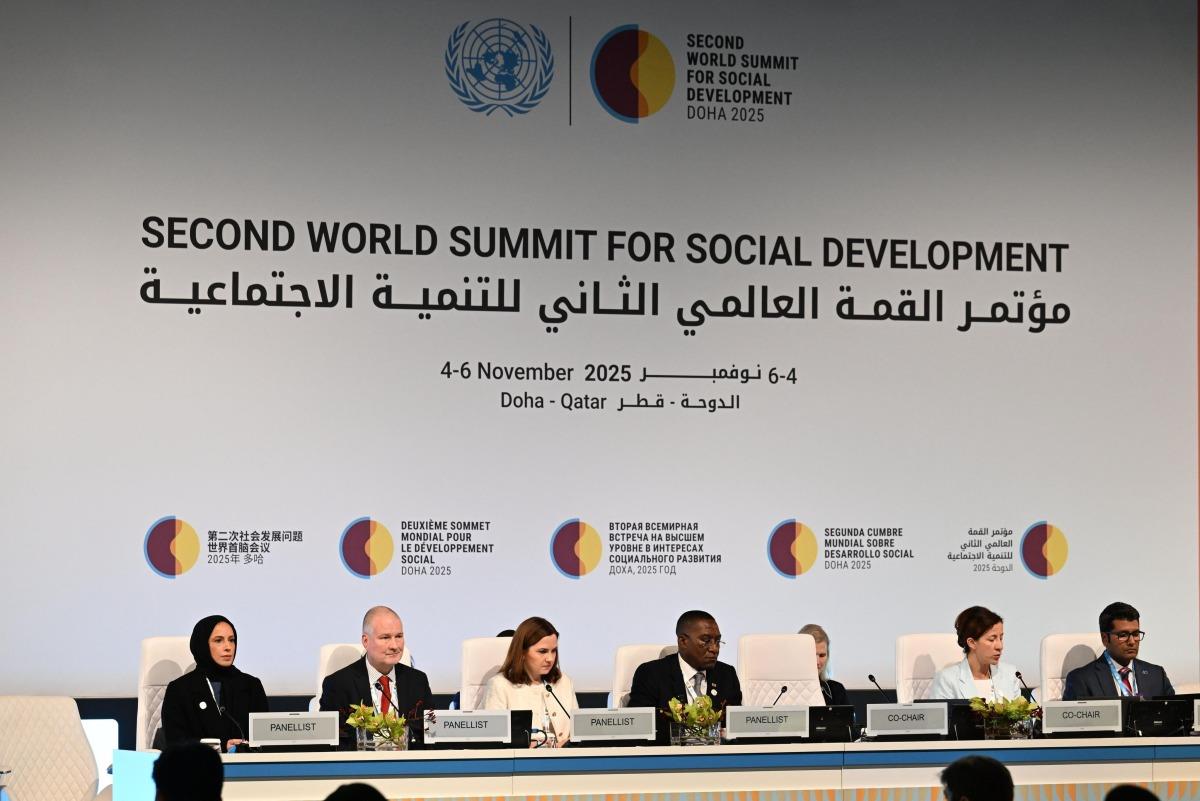
'Qatar's Strong Fiscal Stability Allows Continued Social Spending'
Doha, Qatar: Qatar has maintained strong fiscal stability through prudent economic management and long-term planning, Minister for Social Development and Family, H E Buthaina bint Ali Al Jabr Al Nuaimi, has said.
Speaking during the final round-table discussion of the Second World Summit for Social Development yesterday, the minister noted that the initiative has allowed social spending to continue and expand even during periods of global volatility.
“Qatar believes that social investment is not a cost - it is a driver of stability and growth. Further, it recognises that many developing countries face severe fiscal constraints; therefore, the Qatar Fund For Development provides concessional loans, grants, and guarantees to promote sustainable development, reduce poverty, and provide humanitarian aid,” she added.
Speakers at the session evaluated the progress made since the First World Summit took place in Copenhagen 30 years ago. They emphasised the importance of fulfilling both the previous commitments and those made on Tuesday, ensuring that future generations do not inherit the same issues.
The panel, entitled“Assessing progress and addressing gaps and challenges in the implementation of the commitments of the Copenhagen Declaration on Social Development and its Programme of Action and giving momentum towards the implementation of the 2030 Agenda for Sustainable Development,” was co-chaired by Roxana Mînzatu, the European Commission's Executive Vice-President for Social Rights and Skills, Quality Jobs and Preparedness, alongside Geoffrey Hanley, Deputy Prime Minister of Saint Kitts and Nevis.
Moderated by Armida Alisjahbana, the Under-Secretary-General and Executive Secretary of the Economic and Social Commission for Asia and the Pacific (ESCAP), a varied group of speakers was posed a series of questions aimed at examining how individuals and nations have progressed over the 30 years from Copenhagen to Doha.
Regarding the impact of debt on the fulfilment of commitments during that timeframe, Guylain Nyembo Mbwizya, the Minister for Planning and Coordination of Development Aid in the Democratic Republic of the Congo, highlighted that numerous developing nations are compelled to manage debt and adhere to budgetary limitations without adequate assistance. Consequently, these nations encounter a“significantly diminished capacity for social initiatives,” he remarked, a situation further aggravated by the presence of conflict. In his own nation, he indicated that the ongoing war has led to a 40 percent reduction in the national budget. While advancements are being made, he emphasised:“However, once again, the issue of financing is crucial to the matter.”
When inquired about another barrier to progress - the influence of inequality, insecurity, and a lack of trust in institutions - Sanni Grahn-Laasonen, the Minister for Social Security of Finland, stated that“trust is the most valuable asset a society can possess.” It flourishes when individuals feel secure and included, and for Finland, fostering trust is a policy objective - not merely a developmental result. Drawing from her country's experiences, she noted that trust develops gradually through fairness, inclusion, and transparency - initiatives such as decentralised governance, open data, and a free press“empower individuals to influence the policies that affect their lives.”
She also emphasised the advantages of equitable taxation, noting:“Citizens are more inclined to support taxes when they observe tangible, concrete benefits in their lives, and governments require revenue to provide these benefits.” Asked what other concrete actions can help realise the commitments made in Copenhagen, Matthias Thorns, Vice-President to and Employers' Group Spokesperson at the International Labour Organization (ILO) of the International Organization of Employers, stated:“We need to strengthen the accountability frameworks.”
Voluntary national review mechanisms must be strengthened -“it cannot be a 'tick-the-box' exercise”, he stressed - as there were no unified monitoring frameworks for 20 years following the Copenhagen Declaration. This only came with the Sustainable Development Goals in 2015. Pointing out that“what you do not measure, you cannot improve”, he urged a holistic monitoring system going forward that includes measures to promote a sustainable business environment; this, then, provides a source of decent work and growth.
Further on monitoring, Sabina Alkire, Director of the Oxford Poverty and Human Development Initiative, advised the international community to“keep the poverty score using a few headline numbers - and not a thunderstorm”. For example, the Doha Declaration recognises that 800 million live in monetary poverty and that over 1 billion live in multidimensional poverty.“This headline means that we can compare poverty across time and place,” she pointed out, and“having headlines helps us focus and coordinate”. However, these headlines must be disaggregated to illuminate inequalities by age, location, disability status and other metrics so that no one is left behind.

Legal Disclaimer:
MENAFN provides the
information “as is” without warranty of any kind. We do not accept
any responsibility or liability for the accuracy, content, images,
videos, licenses, completeness, legality, or reliability of the information
contained in this article. If you have any complaints or copyright
issues related to this article, kindly contact the provider above.

















Comments
No comment